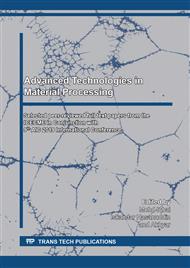[1]
R. Z. Valiev and T. G. Langdon, Principles of equal-channel angular pressing as a processing tool for grain refinement,, Prog. Mater. Sci., vol. 51, no. 7, p.881–981, (2006).
DOI: 10.1016/j.pmatsci.2006.02.003
Google Scholar
[2]
K. R. Cardoso, D. N. Travessa, W. J. Botta, and A. M. Jorge, High Strength AA7050 Al alloy processed by ECAP: Microstructure and mechanical properties,, Mater. Sci. Eng. A, vol. 528, no. 18, p.5804–5811, (2011).
DOI: 10.1016/j.msea.2011.04.007
Google Scholar
[3]
S. R. Zhang, Y. H. Peng, and D. Li, FEM simulation of micro-crystalline materials during ECAP based on the dislocation evolution method,, Chaos, Solitons and Fractals, vol. 89, p.139–146, (2016).
DOI: 10.1016/j.chaos.2015.10.016
Google Scholar
[4]
Y. Duan, L. Tang, G. Xu, Y. Deng, and Z. Yin, Microstructure and mechanical properties of 7005 aluminum alloy processed by room temperature ECAP and subsequent annealing,, J. Alloys Compd., vol. 664, p.518–529, (2016).
DOI: 10.1016/j.jallcom.2016.01.022
Google Scholar
[5]
M. H. Shaeri, M. Shaeri, M. Ebrahimi, M. T. Salehi, and S. H. Seyyedein, Effect of ECAP temperature on microstructure and mechanical properties of Al-Zn-Mg-Cu alloy,, Prog. Nat. Sci. Mater. Int., vol. 26, no. 2, p.182–191, (2016).
DOI: 10.1016/j.pnsc.2016.03.003
Google Scholar
[6]
M. I. Abd El Aal and M. M. Sadawy, Influence of ECAP as grain refinement technique on microstructure evolution, mechanical properties and corrosion behavior of pure aluminum,, Trans. Nonferrous Met. Soc. China (English Ed., vol. 25, no. 12, p.3865–3876, (2015).
DOI: 10.1016/s1003-6326(15)64034-1
Google Scholar
[7]
E. Avcu, The influences of ECAP on the dry sliding wear behaviour of AA7075 aluminium alloy,, Tribol. Int., vol. 110, p.173–184, (2017).
DOI: 10.1016/j.triboint.2017.02.023
Google Scholar
[8]
M. Chegini, A. Fallahi, and M. H. Shaeri, Effect of Equal Channel Angular Pressing (ECAP) on Wear Behavior of Al-7075 Alloy,, Procedia Mater. Sci., vol. 11, p.95–100, (2015).
DOI: 10.1016/j.mspro.2015.11.116
Google Scholar
[9]
M. Howeyze, H. Arabi, A. R. Eivani, and H. R. Jafarian, Strengthening of AA5052 aluminum alloy by equal channel angular pressing followed by softening at room temperature,, Mater. Sci. Eng. A, vol. 720, p.160–168, (2018).
DOI: 10.1016/j.msea.2018.02.054
Google Scholar
[10]
M. H. Goodarzy, H. Arabi, M. A. Boutorabi, S. H. Seyedein, and S. H. Hasani Najafabadi, The effects of room temperature ECAP and subsequent aging on mechanical properties of 2024 Al alloy,, J. Alloys Compd., vol. 585, p.753–759, (2014).
DOI: 10.1016/j.jallcom.2013.09.202
Google Scholar
[11]
Y. Yan, Y. Qi, L. J. Chen, and X. W. Li, Strain rate-dependent high temperature compressive deformation characteristics of ultrafine-grained pure aluminum produced by ECAP,, Trans. Nonferrous Met. Soc. China (English Ed., vol. 26, no. 4, p.966–973, (2016).
DOI: 10.1016/s1003-6326(16)64193-6
Google Scholar
[12]
S. N. Alhajeri, N. Gao, and T. G. Langdon, Hardness homogeneity on longitudinal and transverse sections of an aluminum alloy processed by ECAP,, Mater. Sci. Eng. A, vol. 528, no. 10–11, p.3833–3840, (2011).
DOI: 10.1016/j.msea.2011.01.074
Google Scholar


